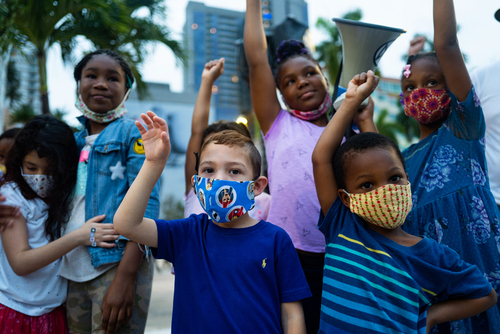Are you struggling to talk to your children about the ongoing racial tensions in our country and looking for tips to help start a conversation about racism?
Psychologists say it is important to encourage children to celebrate their differences—diversity is a strength. For parents of color, this may involve celebrating your heritage and affirming their features and skin tone. For others, this may involve educating your child to become a better ally. This kind of positive racial and ethnic socialization can have a protective effect as they get older and encounter racial adversity.
Here are more tips from psychologists.
Start Early
Research shows that children start to become aware of racial differences at a young age. Children notice racial differences as early as six-months old. They can start to develop biases between the ages of two and four. By 12, children start to develop their own self beliefs.
As your children grow up, they will learn about race and racism from what they see and hear things from friends or online. Parents can take control and share positive messaging about race at an early age.
Prepare for the Conversation
You may be concerned about what to say when talking to your child. If you’re not sure how to approach your child, start by having a conversation with others such as family members, close friends or a community leader.
As parents, you will have tough conversations throughout your child’s life, on topics ranging from death to puberty. It’s never too early to have a conversation about racism. Another way is to engage your children with such things as books, television programs or toys that show different cultures and inclusivity.
Ask Your Child Questions
Once you have a conversation, it doesn’t end there. Follow up with your child to ask if they have questions about what you discussed with them. Find ways to ask questions that blend with their normal routines or when they have downtime. Engage with them by asking about what they are seeing on TV or hearing from their friends.
Just because they may not be engaged during the conversation or have initial questions doesn’t mean they’re not thinking about it.
Pay Attention to their Media Intake
In this digital age, children consume a lot from watching TV or surfing the web. News clips or social media may circulate displaying signs of hate or violent imagery. Put devices away when it is time to have a proactive conversation with your child.
Young children may be unsure how to process what they’re seeing or hearing. For older kids, the news may elicit fear and worry. Be aware of what they’re consuming as images can be traumatizing, especially for children of color (e.g., the viral videos documenting killings of unarmed Black and Latino people). Parents should talk about ways to process that trauma.
Examine Your Own Biases and Beliefs
This may not be easy, but raising anti-racist kids starts with doing work on yourself. Do a self-assessment and introspection. Children pick up on what they hear and see from adults. Examine your family goals and the values you’ve set.
Ask yourself whether you have taught your children to treat everyone with equality and fairness. Are you upholding those values personally? What is it that you can do to set a better example for your child? Ask yourself these questions. It may be that you revisit your family values with your child or work together to develop new ones.
This resource is made possible through a partnership between the American Psychological Association and National PTA to educate parents and teachers about behavioral health and emotional well-being.





